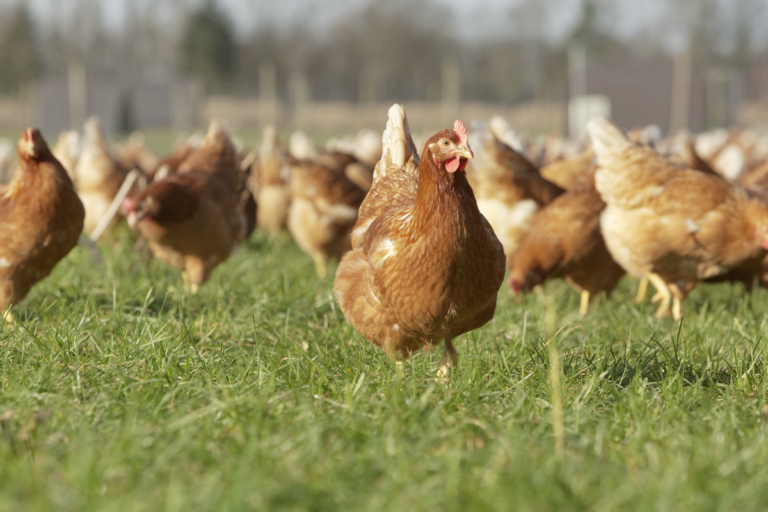Known as one of the most highly contagious respiratory diseases affecting layer flocks, Infectious Laryngotracheitis (ILT) is something the poultry industry is well aware of. With recent outbreaks in Northern Ireland serving as a reminder that we must continue to protect our birds against this virus as best we can, Katie Pitman, veterinary technical manager at MSD Animal Health UK, sheds light on a new option available for UK producers to provide long lasting protection against the disease.
What is ILT and how can we spot it?
ILT is an economically important disease which affects poultry producers worldwide. The disease is caused by a herpesvirus and is transmitted by infected birds, usually through bird-to-bird contact, or contact with respiratory secretions or droppings from infected birds. It can establish a latent infection, remaining in the nerve tissues of a host bird, meaning that although birds may be asymptomatic, they will be carriers for life and can start to shed the virus following periods of stress.
This means that the virus can be spread between poultry sites in a number of different ways, including the transportation of infected birds, for example from one farm to another, or spreading contaminated litter near a poultry site.
“As this is a respiratory disease, common signs include a nasal discharge which can be blood stained, conjunctivitis and noisy laboured breathing,” explains Pitman.
“The disease is extremely contagious, with research showing it typically spreads through 50-100% of the flock if introduced, with mortality rates varying from 10-70%. If the flock has reached lay age, producers will often observe a drop in egg production.”
Usually after around two to three weeks the infection begins to clear, but during the time of infection, productivity is significantly impacted. Even after a full recovery, birds are considered carriers for life which means they will always be a source of potential infection for susceptible birds.
Once birds are infected with the disease, there is no specific treatment available, though antibiotics may be used to manage secondary infections. Phyto therapeutic products with an anti-inflammatory effect may also make affected birds more comfortable. Preventative and proactive disease control is a must to keep the disease at bay.
Protecting flocks against ILT
“It’s paramount that producers have strict biosecurity measures on-farm as this will help reduce the likelihood of an outbreak. Minimising movement in and out of bird enclosures, disinfecting footwear before and after visiting birds, and making sure rodents are effectively controlled are all measures that can help to keep the farm clean and less susceptible to disease,” Pitman explains.
However, due to how contagious this viral disease is, relying solely on good biosecurity can still leave birds vulnerable to an outbreak.
Since the early 1960s producers have been using vaccinations as the principal tool in the control of the disease, with these largely in the form of live attenuated vaccines or recombinant herpesvirus of turkeys (HVT) vaccines. As research and innovation continue to enable the poultry industry to move forwards, a new vaccination has now become available which has the added benefit of protecting chickens against three separate infections by using one single injection; Newcastle disease virus (NDV), ILT and Marek’s disease.
“Existing ILT vaccines have been beneficial for pullet rearers over the years, protecting birds from outbreaks and thereby saving businesses from huge financial loses. But as with every industry, we’re continuously looking at ways in which we can enhance our disease prevention tools, so that they are both effective and convenient to use,” she says.
“Our new vaccine, known as Innovax-ND-ILT, is incredibly convenient for producers as one injection provides birds with long-term protection against ILT and Marek’s disease which are challenging diseases facing the industry, and NDV which is a notifiable disease.
“This also removes the need to administer a field booster vaccination, saving producers labour time, and benefiting birds by reducing the number of vaccinations that need to be administered during critical growth periods.”
When it comes to administration, this all takes place in the hatchery either by in-ovo vaccination, where the vaccine is injected by inserting a needle into the egg, or subcutaneous injection of chicks at one day old.
Pitman adds that the in-ovo and one day old administration enables mass vaccination to take place in the hatchery, offering early protection and creating space in busy on-farm vaccination programmes.
As the vaccination is a dual construct recombinant vaccine, it is formed by taking encoding parts of the ND and ILT virus and inserting them into the turkey herpesvirus (HVT) vector, which then acts as the host. This means that the ND and ILT vaccine virus cannot spread from bird-to-bird or revert to virulence and causing clinical symptoms of the disease.
“Poultry is a technically advanced agricultural sector, so it’s important that in addition to effective disease prevention tools, we also continue to work on simplified administration methods which are convenient and successful for producers.
“Recent events have shown the long-lasting negative impact ILT outbreaks have on poultry health, not forgetting how damaging it can be to businesses. So we’re extremely pleased that this new vaccination will provide much needed protection to birds, while also being a more convenient solution for producers.”

Previous ArticleUK to declare AI-free status on 3 September
Chloe Ryan
Editor of Poultry Business, Chloe has spent the past decade writing about the food industry from farming, through manufacturing, retail and foodservice. When not working, dog walking and reading biographies are her favourite hobbies.

